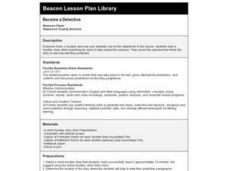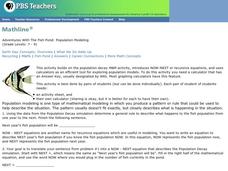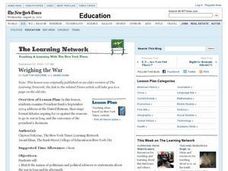Curated OER
Predict and Clarify with The Old Woman & Her Pig
Primary readers predict and check for understanding by using comprehension strategies. Prepare readers the first day by frontloading vocabulary and using pictures to visualize the words. On the second day, read the story The Old Woman...
Curated OER
Dusty Locks and the Three Bears
Read this twist on Goldilocks and the Three Bears: Dusty Locks and the Three Bears by Susan Lowell. Kindergartners listen, predict, and discuss the story. They then participate in a dramatization of the story and draw a picture...
Curated OER
A Hidden Beauty
Expose the beautiful mystery of bulbs as young botanists learn all about these fascinating plants. They glean information from a short text before observing actual bulbs (consider an onion), and comparing their findings with predictions....
Curated OER
High School Mathematics Problems from Alaska: Predicting Plant Coverage
Students participate in simulation as they examine vegetation in a square meter land plot. Students construct charts and a key to make predicitons about other land plots.
Curated OER
Sink or Float?
Young scholars make and test predictions about sinking and floating, and classify objects according to whether they sink or float.
Curated OER
Weather Maps and Prediction
Young meteorologists read basic weather maps by learning about the symbols that are associated with them. This two-day lesson plan has some excellent demonstrations and activities to get youngsters thinking about the weather in...
Curated OER
Do You Feel Lucky?
Young scholars calculate simple probabilities using mathematics then roll dice to test their predictions.
Curated OER
Becoming Whales: Experiencing Discoveries of
Students experience, through a "dig," the historical discovery of fossils which increasingly link whales to earlier land-dwelling mammals. They encounter the intermediate forms which show changes that lead to the modern whale.
Curated OER
Counting Crows
Young scholars discuss the fable, The Crow and the Pitcher. In this literature instructional activity, students read the fable and create a crow sock puppet. Young scholars use their puppets to dramatize the fable.
PHET
My Solar System
Orbit diagrams appear to be a work of mathematical art. The simulation helps scholars build their own systems of planets, stars, moons, etc., to observe their orbits. By altering their positions, velocities, and masses, a variety of...
Curated OER
"Easter" Egg Genetics
Using plastic Easter eggs to represent parent phenotypes, genetics enthusiasts simulate the passing of alleles. They record the phenotype of each half of the egg, one representing the mother's and one representing the father's. They...
Beyond Benign
The Big Melt: Arctic Ice Caps
Are the Arctic ice caps really melting out of existence? Junior climatologists examine the statistics of ice decline through four math-based lessons. Each activity incorporates data, climate information, and environmental impact into an...
Howard Hughes Medical Institute
Ocean Acidification
Human impacts on the environment can sometimes be difficult to measure, especially under water! An activity centered on ocean acidification gives science scholars the opportunity to examine the effects of carbon dioxide on marine life....
Curated OER
Become a Detective
Students participate in a simulation where they act as detectives to locate a missing item using questioning and prediction techniques. Then they read a portion of a story, write a prediciton paragraph, and then finish reading the story.
Curated OER
Muggie Maggie: Lesson 8
Students predict a chapter from a book while learning new vocabulary words. In this reading comprehension lesson, students read the book Muggie Maggie, and predict what will happen in the upcoming chapter. Students read and...
Curated OER
Who Took the Cookies
Students find the missing cookies. In this language arts lesson, students solve the mystery of who is taking the cookies from the cookie jar. Students are read several books with the same mystery of cookies being taken from the jar.
Curated OER
Everyday Measurements
Fourth graders practice measuring items with unconventional methods. In this measurement prediction lesson, 4th graders estimate the length of items a teacher brings to class and record their predictions. Students measure the...
Curated OER
Pride and Prejudice, Chapter XIV: Lady Catherine and Elizabeth
Is your class reading Pride and Prejudice? In order to link scenes to the themes in Austen's novel, pairs take on the confrontation between Lady Catherine and Elizabeth (Chapter XIV). After writing their own version of the...
Curated OER
Wellness and the Benefits of Exercise
Second graders discuss benefits of keeping physically fit, predict effects of exercise on their bodies, perform various exercises correctly, including push-up, curl-up, and jumping jack, discuss and follow safety practices while...
Curated OER
Probability and Statistics
Elementary schoolers choose from a host of activities to investigate probability and statistics. They complete worksheets, create 3-D graphs, and play graph bingo. They make weather predictions and list all the possibilities before going...
Curated OER
What Would You Do?
Students explain how we all face tough decisions everyday. They show how they respond to those events reveals who they are and where they are in their character/moral development. Students predict how to deal with peer pressure and...
PBS
Adventures With The Fish Pond: Population Modeling
Build up from the previous activity where your learners charted the population growth and decay of a fish pond with M&Ms®. Have them look at the data from that activity and create a Now-Next, or recursive equations, to predict the...
PHET
Molecules and Light
Does light affect molecules or does it go right through them? The simulation explores four different types of light: microwave, infrared, visible, and ultraviolet. Scholars alter the energy level of each as it is aimed at seven different...
Curated OER
Weighing the War
Study opposing viewpoints with this lesson, which examines President Bush's September 2004 address at the United Nations. Middle schoolers study the text of the address, and then stage formal debates arguing for or against the reasons to...
Other popular searches
- Making Predictions
- Predictions
- Predicting Outcomes
- Reading Predicting Outcomes
- Reading Making Predictions
- Make Predictions
- Pictures Story Predictions
- Lesson on Making Predictions
- Reading Predictions
- Story Prediction
- Predicting a Story























